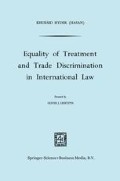Abstract
Before the First World War, the unconditional most-favoured-nation clause was employed by most of the European countries and Great Britain in their treaties of commerce among themselves. Discrimination in tariffs was practiced by some of the European States, notably France and Spain. The United States’ acceptance of the most-favoured-nation clause was conditional, or on the basis of reciprocity. This led to numerous complaints from countries with which the United States had most-favoured-nation treaty rights.1 It is generally conceded that the conditional most-favoured-nation clause is, in a way, the negation of the principle of equality of treatment underlying the clause. The essence of the clause lies in its exclusion of every sort of discrimination whereas the conditional clause constitutes, by its very nature, a method of discrimination. It does not offer any of the advantages of the most-favoured-nation clause proper, which seeks to eliminate economic conflicts, to simplify international trade and to establish it on firmer foundations. Moreover, it is open to the very grave objection of being unfair to countries which have very few, or very low, duties, and which are thus less favourably situated than those which possess heavy duties.2
Access this chapter
Tax calculation will be finalised at checkout
Purchases are for personal use only
Preview
Unable to display preview. Download preview PDF.
References
For details of diplomatic controversy on the subject and official American pronouncements on the construction of the Clause see, Moore, Digest of International Law, Vol. V, pp.257–319.
Also Articles 265, 266 and 267 of the Treaty of Versailles. See Temperley, A History of the Peace Conference of Paris (Oxford, 1920), Vol. III, pp. 242–243.
United Nations, Department of Economic Affairs, Customs Unions, (New York, 1947), p. 54. For the text see L.N.T.S., No. 2893 Vol. CXXVI, p. 343.
League of Nations, European Union 1932 (Ser. L.N. Pub. Pol. 1932. VII. 33), p. 23.
For a general background see Robert E. Clute and Robert R. Wilson, “The Commonwealth and Favoured-Nation Usage,” A.J.I.L., Vol. 52 (1958), PP. 455-468.
Whidden, Preferences and Discrimination in International Law (New York, 1945), p. 20.
For the text of the Tripartite Declaration see Federal Reserve Bulletin (October, 1936), p. 759.
League of Nations, Doc. C. 358. M. 242 (1937) Ser. of the L.N. Pub. Economic and Financial 1937. II. B.
U.N. Monetary and Financial Conf., Final Act and Related Documents (Washington, 1944, U.S. Dept. of State Pub. No. 2187, Conf. Ser. 55), p. 24.
TIAS No. 1545. See also Anglo-American Financial and Commercial Agreements (U.S. Dept. of State, December, 1945, Pub. No. 2439, Commercial Policy Ser. No. 80), p. 10.
United Nations Conference on Trade and Employment, Report of the First Session of the Preparatory Committee (London, 1946), Annexure 1, p. 42.
Rights and permissions
Copyright information
© 1968 Springer Science+Business Media Dordrecht
About this chapter
Cite this chapter
Hydert(hasan), K. (1968). Background to M.F.N. Clause in Gatt. In: Equality of Treatment and Trade Discrimination in International Law. Springer, Dordrecht. https://doi.org/10.1007/978-94-011-9062-6_3
Download citation
DOI: https://doi.org/10.1007/978-94-011-9062-6_3
Publisher Name: Springer, Dordrecht
Print ISBN: 978-94-011-8375-8
Online ISBN: 978-94-011-9062-6
eBook Packages: Springer Book Archive

